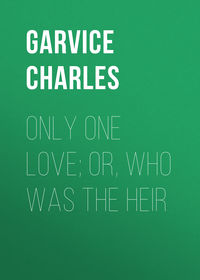Kitobni fayl sifatida yuklab bo'lmaydi, lekin bizning ilovamizda yoki veb-saytda onlayn o'qilishi mumkin.
«Only One Love; or, Who Was the Heir» kitobidan iqtiboslar

he looked remarkably well; when, for instance, he was delivering a lecture or an address at some institute or May meeting. His voice was low and soft, and not seldom insinuating, and some of his friends had called him, half in jest, half in earnest, “Fascination Davenant.” It will be gathered from this description that to call all the race of Davenants bad was unfair; every rule has its exception, and Stephen Davenant was the exception to this. He was “a good young man.” Fathers held him up as a pattern to their wayward sons, mothers patronized and lauded him, and their daughters regarded him as almost too good to live. The minutes, so slow for the watchers, so rapid to the man for whom they were numbered,

never have been written. If half the stories which were told of him were true, Ralph Davenant, the present owner of Hurst, deserves a niche in the temple of fame – or infamy – which holds the figures of the worst men of his day. He had been a gambler, a spendthrift, a rogue of the worst kind for one half his life; a miser, a cynic, a misanthrope for the other. And he now lay dying in his huge, draughty bed-chamber, hung with the portraits of his ancestors – all bad and filled with the ghosts of his youth and wasted old age. As it was, he lay quite still – so still that the physician, brought down from London at a cost of – say, ten guineas an hour, was often uncertain whether he was alive or dead.
never have been written. If half the stories which were told of him were true, Ralph Davenant, the present owner of Hurst, deserves a niche in the temple of fame – or infamy – which holds the figures of the worst men of his day. He had been a gambler, a spendthrift, a rogue of the worst kind for one half his life; a miser, a cynic, a misanthrope for the other. And he now lay dying in his huge, draughty bed-chamber, hung with the portraits of his ancestors – all bad and filled with the ghosts of his youth and wasted old age. As it was, he lay quite still – so still that the physician, brought down from London at a cost of – say, ten guineas an hour, was often uncertain whether he was alive or dead.
